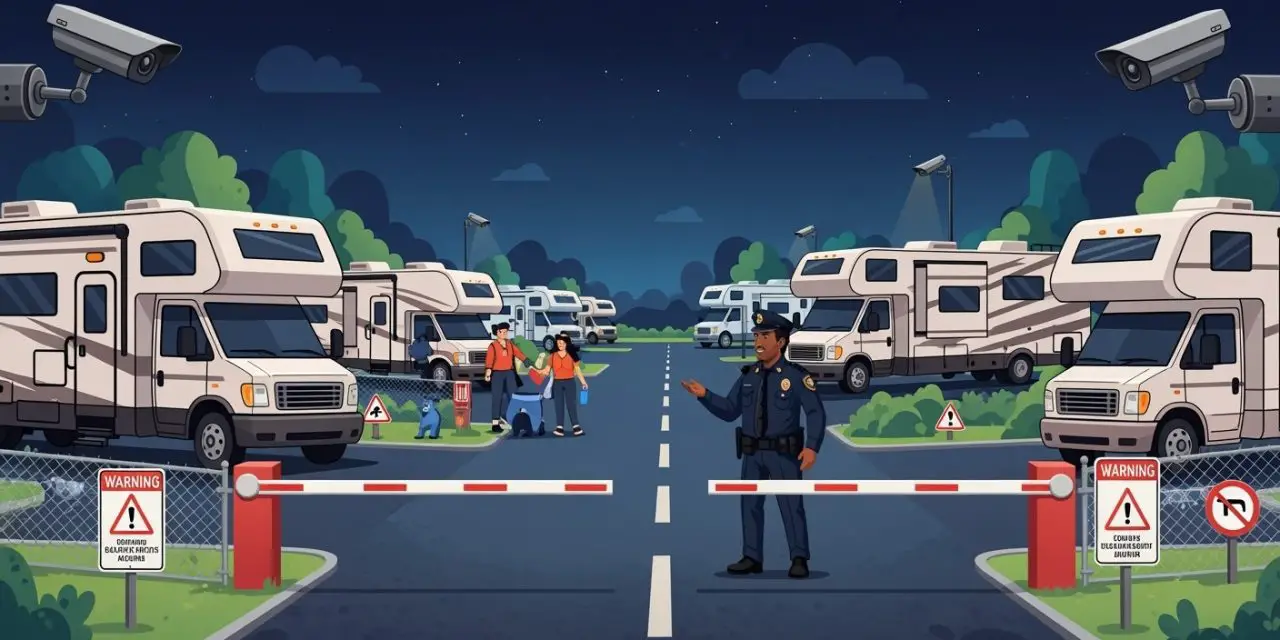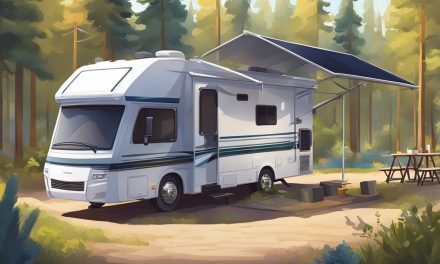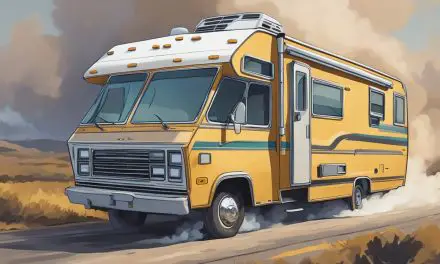Would you like to save this article?
The world of RV camping has exploded in popularity, with millions of Americans hitting the road in search of freedom and adventure. However, beneath the Instagram-worthy sunsets and campfire stories lies a reality that many RVers prefer not to discuss: not all campgrounds are created equal, and some can pose serious safety risks to you and your family.
The RV community often focuses on the romantic aspects of nomadic life while glossing over the potential dangers that lurk in poorly managed parks. What makes this even more concerning is that many well-meaning travelers simply don’t know what red flags to look for when choosing a place to park for the night.
Fortunately, we found a great video from the RV Odd Couple YouTube channel where campground owners John and Mercedes share invaluable safety wisdom from Chief Buddy, a local police officer who became their mentor in creating one of the safest campgrounds in the country.
1. Always Carry Protection (Yes, Really)
When Chief Buddy was asked about making Thunder Canyon one of the safest campgrounds, his first response was surprisingly direct. As John recalls from their conversation: “Chief what could I do here at Thunder Canyon to make this one of the safest campgrounds for you and your family to camp at? And he looked at me and he smiled and he said ‘John you got a gun on you?'” The police chief’s advice was simple but serious: “Make sure you always carry a weapon with you always.”
This isn’t just about protecting yourself from two-legged threats either. Chief Buddy emphasized the importance of being prepared for wildlife encounters as well. While this might make some RVers uncomfortable, it’s a sobering reminder that you’re often in remote areas where help might be far away. Think of it as the ultimate insurance policy you hope you’ll never need – like jumper cables, but significantly more serious and potentially life-saving.
2. Gates Aren’t Just for Keeping People Out – They’re for Peace of Mind
The first major security improvement Chief Buddy recommended was installing a gate at the campground entrance. As John explains: “The first suggestion that Chief Buddy gave us was to put up a gate right at the entrance of the campground so that outsiders could not get in and so that we could protect our patrons and our campers.” While acknowledging that “This gate is not the Great Wall of China You could walk through it right but there’s something about a gate that makes it clear that this is not a place that people can just drive by.”
The psychological effect of a gate cannot be understated. It’s like putting a “Members Only” sign on a bathroom door – even if anyone could technically enter, most people respect the boundary. For families camping with children, knowing that random strangers can’t just cruise through your temporary neighborhood at 2 AM is worth its weight in marshmallows. Plus, it dramatically reduces those awkward moments when people want to “just look around” while you’re trying to enjoy your morning coffee in your pajamas.
3. Cameras Are Your Silent Guardians (Not Big Brother)
Chief Buddy’s second recommendation was strategic camera placement throughout the campground. “John I would suggest you put security cameras surveillance cameras especially at the entrance and in public areas around the park,” he advised. But he was quick to clarify the boundaries: “I’m not telling you to spy on all your campers.”
The RV Odd Couple installed about seven cameras focused on entrances and public areas, which provides security without being invasive. As they note: “People that have nothing to hide have nothing to hide right and so if you’re looking at a campground and you see uh cameras it should actually instill security and safety in you not fear because it the camera doesn’t lie.” It’s like having a really good security guard who never sleeps, never takes bathroom breaks, and never gets distracted by their phone. The beauty is that cameras don’t just catch bad actors – they deter them from showing up in the first place.
4. Communication Is Key (Literally)
The third tip from Chief Buddy was implementing a radio system for all staff members. “All staff needs to have one of these,” he told them, referring to two-way radios. The system they implemented covers their large property effectively: “Thunder Canyon is huge And so from the gate down to the end of the circle where the fellowship hall is and the house is it’s about 38 of a mile So there’s a lot of area to cover These radios help us to get to where we need to be quickly.”
What’s particularly clever is that they’ve given radio call signs to everyone, including the kids: “I’m Rooster That’s Mother Hen and Sagei is Tweety.” This creates a network of eyes and ears throughout the campground while making it fun for families. It’s like having a real-life version of those spy movies, except instead of international espionage, you’re coordinating who’s bringing the first aid kit and making sure little Timmy didn’t wander off to the creek again.
5. Background Checks Might Be Controversial, But They Work
The final and perhaps most controversial recommendation was implementing background checks for long-term residents. “Buddy suggested that anybody that was coming in full-time or or or longterm that we do background checks on them,” John explains. While this might seem extreme, their reasoning is sound: “It’s not just me I’m looking out for It’s not just my child It’s not just the safety of the other campers here the souls on board of this ship called Thunder Canyon It’s also the local community.”
This approach helps create what they call a “membership campground” culture where people are invested in the community rather than just passing through. As they put it: “that little bit of a premium it filters out people that prioritize their beer budget over their camping budget.” While some might find this exclusionary, it’s hard to argue with the results when you’re trying to create a safe environment for families. It’s like having a bouncer at a nightclub, except the club is a campground and instead of checking IDs, they’re checking criminal records.






